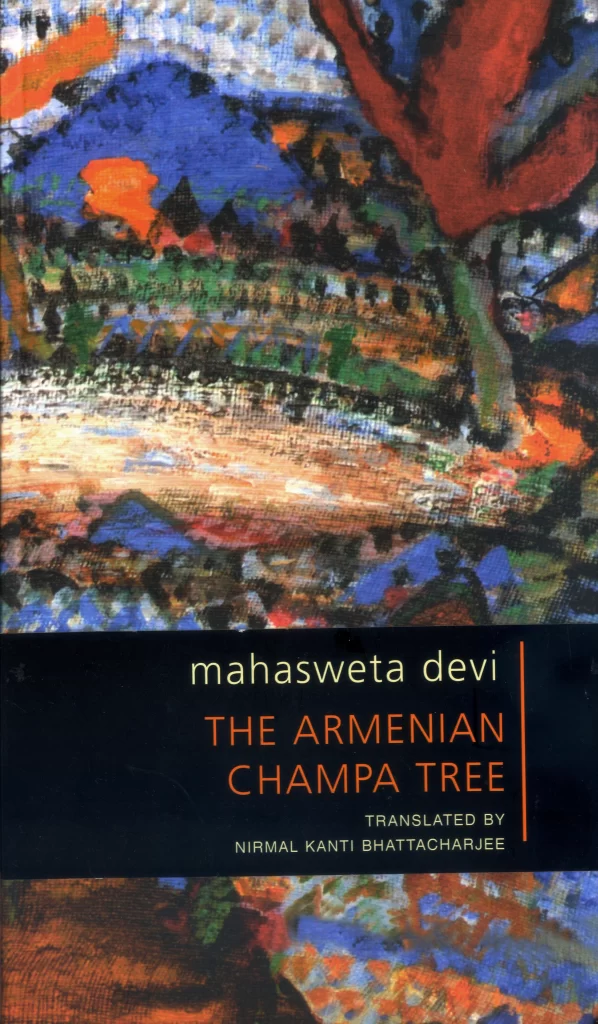Mato, the protagonist in Mahasveta Devi’s story The Armenian Champa Tree, is a boy of about 10 years old who grows up in a village of the Buno people in West Bengal with his mother and several siblings. His mother is worried about him because he is so different from how Buno boys his age should be. He likes to keep to himself, spends a lot of time in nature, is interested in plants and animals, makes scarecrows and strange dolls and shows no sign to be willing to contribute to the family’s livelihood. He prefers to play with his little pet goat Arjun, whom he has taken to heart.
How different is his older brother Chhibilas, who leads a small gang of robbers who are targeting food and other necessities to supplement the family’s meager income. The resolute, vivacious Chhibilas and the dreamer Mato, who seems to be too soft for the life struggle ahead of him in a country that is often hit by floods and that also has to suffer under the burden of money- and land-hungry zamindars – the book leaves little doubt why the mother, herself a resolute woman with real leadership qualities, who often takes on difficult tasks and responsibilities in the village, is dissatisfied with Mato and very concerned about his future. The family’s own land holdings are tiny and the local landowner very devious and ruthless in order to keep the villagers completely dependent on him. (The zamindar system reduced most of the people to a kind of slavery from which they had no chance of ever getting out because of debt.) What will become of the boy?
One day, a kapalik, a mystic, appears in the village and prophesies that a severe flood is imminent that will destroy the entire village unless an animal sacrifice is made to the mother goddess: Mato’s goat! Mato decides to flee with Arjun. He wants to reach the Armenian Church in Baharampur. In the yard of the church is a rare Champa tree, and the boy is fascinated by its blossoms and scent. According to traditional belief, an animal that reaches the churchyard is unfit to be sacrificed.
What follows is the description of Mato’s and Arjun’s desperate escape from a growing pack of humans who are hunting them. The superstition that if Arjun cannot be slaughtered, the village will be destroyed by the flood is just too strong. There are also friends of Mato and his brother Chhibilas in the group of hunters, but they are increasingly wondering what they are actually doing here. Chhibilas has to admit that he misjudged Mato, who shows great courage, determination and physical strength during the escape, and now admires this brother for his daring and resistance.
Of course, I won’t reveal here how the story ends. This little book was apparently written for young readers, and it contains some important teachings for young people, delivered without a finger wagging. The author shows a lot of empathy in the description of the mother and also of the sensitive boy Mato himself. Mahasweta Devi, the prolific Bengali author, fought for decades as an activist for the social rights of the Indian rural population and especially the indigenous groups such as the Buno. Her literary attention was also devoted to the role of women. A combative feminism is present in many of her works.
In the description of the insidious behavior of the zamindar, who pretends to give food as a present to the villagers but later demands it back with interest – knowing full well that this will lead to the ruin of the people – as well as the sinister role of religion, which is described here as a mere superstition that is exploited against the villagers in the interest of the ruling class, Devi shows the roots of the social misery of many people on the Indian subcontinent. Although the story takes place more than two hundred years ago, surprisingly little has changed to this day for many people.
Seagull Books, the excellent publisher from Calcutta, must be commended for making many important books by Mahasweta Devi available in English. It’s worth getting to know this author!

Mahasweta Devi: The Armenian Champa Tree (tr. Nirmal Kanti Bhattacharjee), Seagull Books Calcutta London New York 2009
© Thomas Hübner and Mytwostotinki, 2014-23. Unauthorized use and/or duplication of this material without expressed and written permission from this blog’s author and/or owner is strictly prohibited. Excerpts and links may be used, provided that full and clear credit is given to Thomas Hübner and Mytwostotinki with appropriate and specific direction to the original content.



 Facebook
Facebook RSS
RSS Twitter
Twitter